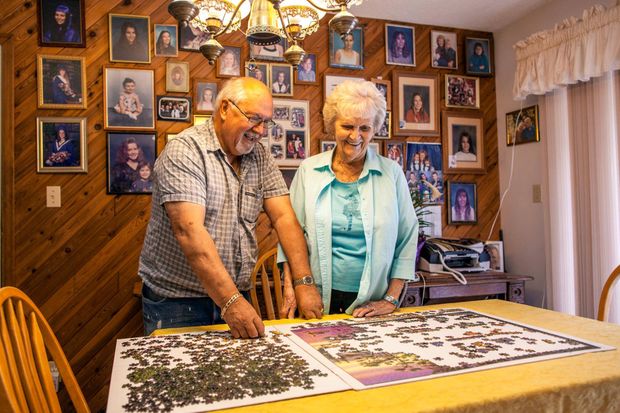Read Original Article & Learn More
By Adriana Barton | The Globe and Mail
This article was originally published April 20, 2017
Around this time of year, Hope Bobowski can’t wait to garden in the flower beds outside her home near Keremeos, in the hills of southern Interior British Columbia.
The petite 79-year-old loves card games and cooking for her great-grandchildren, but the only thing that keeps her on her feet is her daily dose of cannabidiol (CBD), a potent extract of cannabis or hemp.
She took her first spoonful last June, when the pain from osteoarthritis in her back had become so bad that her husband Stan had to dress her, do the cooking and help her in and out of bed. “I was going downhill fast.”
On TV, they saw a show about CBD oil. Her first thought was, “No way, I’m not having anything to do with cannabis.” The way she was brought up, “you didn’t go around drugs.”
Then she thought about the four to six pills of Tylenol 3, laced with codeine, a narcotic analgesic, she took every day. She thought about her doctor’s suggestion that she try opioid painkillers. “You can get hooked on that.”
So, she tried about 10 drops of CBD oil her husband had obtained from an unlicensed producer. Unlike THC – the psychoactive component in cannabis – pure CBD has medicinal properties without any “high.”
The next day, she said, “there was no pain.”
Across the country, seniors are adding cannabis-rich tinctures, oils and capsules to their medicine cabinets. Some – mainly boomers in their mid-50s to early 70s – are rediscovering weed after going for decades without a toke. But often, adults in their 70s, 80s and 90s are trying cannabis for the first time, hoping the plant will ease chronic pain, insomnia, depression and anxiety after pharmaceutical drugs have failed.
In the United States, seniors have become the fastest-growing demographic of cannabis users, CBS News reported last year. Canada, with new legislation to legalize cannabis by 2018, could follow suit.
Recent data on the number of Canadian seniors using cannabis are unavailable. But in 2013, Health Canada figures showed that two-thirds of Canadians registered to purchase medical marijuana were taking it to treat severe arthritis, more common among older adults.
Many cannabis dispensaries are now actively catering to seniors. In Victoria’s Oaklands neighbourhood, a large dispensary called Farmacy draws customers from nearby retirement homes to a brightly lit space with nostalgic photos and vintage apothecary-style display cases housing an array of tinctures, oils and extracts.
Weighing scales measure dried cannabis by the gram, in varieties such as “granddaddy purple” and “blue dream.” But don’t ask for “bud.” Here, they’re called “flowers.”
Andrew Gill, manager of the dispensary since it opened two years ago, estimates that at least 50 per cent of Farmacy’s customers are over age 55. “Make no mistake – we play classic rock every day specifically for them.”
Seniors interviewed for this article said they spend $10 to $50 a week on cannabis products, depending on the severity of their condition. Seniors’ discounts are now available through licensed producers such as Tilray, based in Nanaimo, B.C., and the Cannaclinics chain of dispensaries in Vancouver and Toronto.
Other companies are offering standing-room-only info sessions in libraries and seniors’ centres everywhere from Sudbury, Ont., to Summerland, B.C.
“Demand from seniors looking for information and access to medical cannabis, is definitely increasing,” said Hilary Black, director of patient education and advocacy at Canopy Growth Corporation, the parent company of three of Canada’s largest licensed cannabis producers.
Earlier this month, Black spoke to a group of more than 100 seniors in Qualicum Beach, B.C., at the invitation of the Probus Club, a social network for retirees.
Some of them made sly comments like, “Oh, I bet I could teach you a thing or two – I grew up in the ’60s,” she said. But Black explained that with medical cannabis, patients need to learn the difference between THC and CBD, and that dosage is important, down to the milligram. By the end of the talk, “they realize that things have really changed.”
Many Canadians, seniors included, do not understand the difference between licensed producers, which provide medical cannabis through the mail under Health Canada regulations, and cannabis dispensaries that operate illegal businesses, said Dr. Alan Bell, an assistant professor in the department of family and community medicine at the University of Toronto.
Another misconception is that medical cannabis always causes euphoria, when products such as CBD oil do not. All too often, people assume that using medical cannabis is “an excuse to get high,” he said. “That’s a real stigma that is hanging on the product.”
He notes that some of the most common afflictions of old age, including mood problems, sleep issues and arthritic pain, may respond well to medical cannabis.
For older patients suffering from chronic pain, Dr. Bell said he tends “to use it ahead of opioids.” Opioid painkillers are particularly hazardous for seniors, increasing the risk of falls, mental confusion and opioid dependence, he explained.
A 2016 study, published in the journal Health Affairs, found that physicians wrote fewer prescriptions for elderly and disabled patients who had legal access to medical marijuana. Researchers calculated that in 2013, Medicare saved more than $165-million (U.S.) on prescription drugs in the District of Columbia and 17 states with medical marijuana laws in effect.
Nevertheless, Canadian medical organizations emphasize that more research is needed to determine the extent of marijuana’s potential benefits and harms, and how best to treat patients with medical cannabis.
The Arthritis Society has dedicated $720,000 (Canadian) to medical cannabis research between 2015 and 2019, and asked the federal government for a parallel commitment.
Bell urges seniors interested in medical cannabis to talk to a family doctor. Increasingly, doctors will either write the prescription required by Health Canada, or refer a patient to a physician with more experience in treating patients with medical cannabis, he said. Bell instructs colleagues about the use of medical cannabis through a continuing education program accredited by the College of Family Physicians of Canada, for which he receives consultant fees from the licensed medical marijuana industry.
He strongly discourages patients from purchasing cannabis from storefront dispensaries, since “there is absolutely no quality control – they can make any claims that they choose.”
But Chris Nuessler, a retired RCMP officer in Summerland, B.C., argues that Health Canada’s medical marijuana program is too limited. Patients with specific health problems may need access to hundreds of distinct cannabis species, and different ratios of CBD to THC, before they find something that works, he said. “Unfortunately, the licensed producers just don’t have the selection that people need or want.”
Nuessler, 62, uses high-potency CBD oil from an unlicensed producer to take the edge off post-traumatic stress disorder. He used to get flashbacks to violent scenes from his service in Haiti and the former Yugoslovia. Now, “I’m much more even keel.” The product he takes has no psychoactive effects, he added: “I’m not interested in the high.”
Seniors tend to prefer edible cannabis products, such as oils. Few choose to inhale, said Gill in Victoria. Many are former cigarette smokers. “They fear the habit.”
For all the talk about cannabis becoming as common as bifocals, however, stereotypes about grizzled hippie stoners and the stigma of “reefer madness” endure.
Milton Callwood, 46, fears authorities could remove his 92-year-old father from his care if they discovered he is giving him cannabis from a Vancouver dispensary. (Callwood agreed to an interview on the condition he could use a pseudonym.)
His father suffers from Parkinson’s disease and related dementia. In the fall, shortly after Callwood’s mother died, his father’s uncontrollable shaking and tremors intensified. He could not talk or swallow normal food. “He was pretty much in a vegetative state.”
Callwood got the idea to try cannabis from online forums and a video showing improvements in a Parkinson’s patient who had taken it.
In February, he drove his dad from their home in the suburbs to a dispensary on Vancouver’s upscale West Side. A staff member recommended CBD oil mixed with THC. Since then, the tremors have largely subsided, Callwood said. His father can chew a hamburger or tell his son when he wants to go for a drive. “I have my dad back.”
But, he added, “what if someone deems me unfit to take care of him because I’m doing something that’s considered in the grey zone, legally?”
Concerns about informed consent and evidence-based cannabis treatments will no doubt remain, even after the federal government has hammered out the bumps in its legalization plan.
In the meantime, seniors such as Bobowski say they have all the evidence they need. Since she started taking her nightly spoonful of CBD oil, she said she has slept soundly without any leg cramps or back pain, and has stopped using pharmaceutical painkillers.
“I’m spreading the word.”


